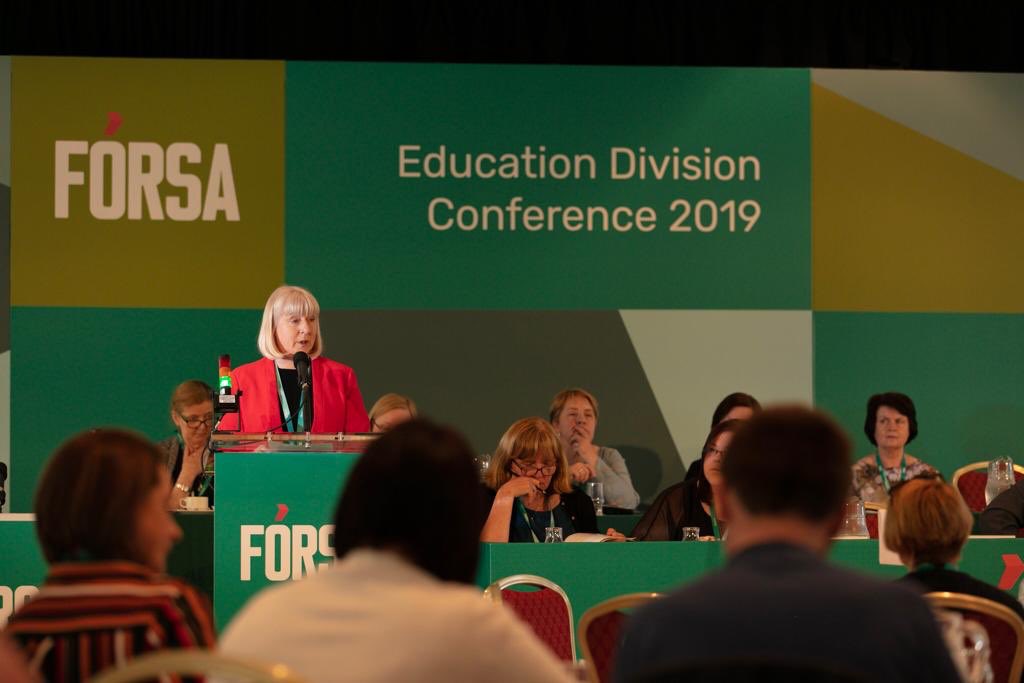Schools teach children that “it’s okay to disrespect and discriminate”
The continued unequal treatment of non-teaching school staff like secretaries, special needs assistants (SNAs) and caretakers is effectively teaching children that it’s “okay to disrespect and discriminate,” according to the leader of Fórsa’s 12,000-strong Education Division.
Speaking at the union’s 2019 Education Conference in Carrickmacross today (Wednesday), Divisional Chair Gina O’Brien (pictured) expressed disappointment that education minister Joe McHugh was unable to attend the event, despite speaking at three teachers’ conferences this week. She said this resonated with non-teaching school staff, who were “constantly undervalued and disrespected.”
Ms O’Brien said a number of the union’s education branches had balloted for industrial action in the last 12 months, mostly because of unequal treatment of groups of education workers.
A number of the union’s education branches had balloted for industrial action in the last 12 months, mostly because of unequal treatment of groups of education workers.
“The children and young people they serve learn through teaching, they learn by doing, and they also learn by example. And there are too many times, across our education communities, where the example they are given is that it’s okay to disrespect and discriminate. Is that the lesson that the ‘best education system in Europe’ is content to send to our children and young people?” she said.
Fórsa outlined a range of examples of the two-tier treatment of education workers, including:
- The exclusion of most school secretaries and caretakers from standard pay scales, working conditions and occupational pensions.
- The denial of SNAs and other non-teaching staff a voice on school boards of management
- School completion staff denied access to a reasonable retirement income because they have no occupational pension scheme
- Staff in Education Centres, who provide continuous professional development for teachers and others, but whose pay and working conditions are determined by “unfair, inconsistent local contracts far removed from the standard pubic service terms”
- Non-teaching staff in higher education who witnessed measures to ring-fence senior academic posts for women, but whose employers stubbornly refused to implement a job evaluation scheme, “the single most effective mechanism for delivering equal pay,” until a ballot for industrial action took place.
“The stubborn reality is that too many politicians and managers in our education system still believe some are more equal than others, and must stay more equal than others. There is still stark inequality in the treatment of staff within a sector committed to delivering equality in our schools and other workplaces,” said Ms O’Brien.
Fórsa’s Head of Education Andy Pike called on Minister McHugh to end the “scandal” of the unfair treatment of grant-funded school secretaries, which arises because local schools have total discretion over their pay and conditions.
Fórsa’s Head of Education Andy Pike called on Minister McHugh to end the “scandal” of the unfair treatment of grant-funded school secretaries, which arises because local schools have total discretion over their pay and conditions.
“As teachers and others departed to destinations near and far on their Easter holidays, the only trip many of our school secretaries could look forward to this Easter was a trip to sign on for job-seekers benefit. It’s high time this inequality and exclusion ended. The cost for schools is small, but the benefits of ending this scandal will be felt in 90% of our schools across the country,” he said.
Fórsa has won widespread political support for its ‘Support Our Secretaries’ campaign, which is calling for school secretaries to be put on standard Department of Education pay and conditions.
“To Minister McHugh we say it’s time to end this injustice. It’s time to do it quickly. It’s time to pay school secretaries what they’re worth. This is the year to end the exclusion, this is the year to end the inequality, this is the year to treat them fairly alongside the rest of the school community,” said Mr Pike.
Mr Pike also called for improved educational supports for the increasing number of school students with disabilities. “Disabilities among the under-20 age group increased by 16% between 2011 and 2016, and our education system aims to provide an inclusive experience for all students. Additional resources need to be invested in education if Ireland is to succeed in implementing the UN Convention of the Rights of Disabled Persons. Fórsa raised this with the National Disability Authority and the Minister for Disabilities at the launch of our Disability Rights Network earlier this month,” he said.
Mr Pike told delegates that the union’s membership in the education sector had risen by over 10% over the last two years, and now stood at over 12,000. It includes SNAs, school secretaries and caretakers, school completion officers, and administrative staff in ETBs, education centres, technological universities and institutes of technology.

